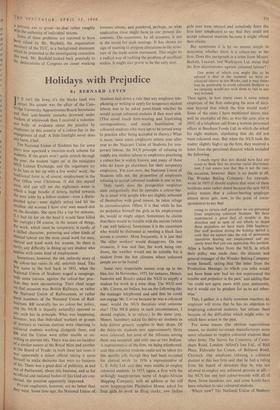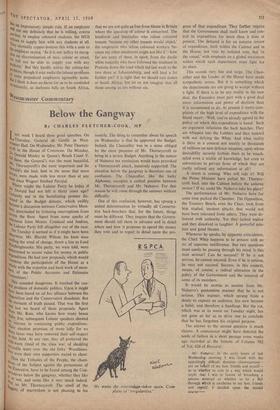Holidays with Prejudice
By BERNARD LEVIN P it isn't the Jews, it's the blacks (and vice versa). No sooner was the affair of the Cam- bridge University Appointments Board Secretaries and their anti-Semitic remarks drowned under buckets of whitewash than I received a volumin- 0ns body of evidence about the practice by emPloyers in this country of a colour-bar in the engagement of staff. A little limelight never does any harm, I feel.
The National Union of Students has for some Years now operated a vacation-work scheme for students. If the grant won't quite stretch through the Year, the student 'signs on' at the miniature NUS Labour Exchange, and the organisers try to fix him or her up with a few weeks' work; the traditional form is, of course, employment in the l'ost Office over Christmas. (I did this myself °nee, and can still see the nightmare scene in which a huge bundle of letters, hurled towards the next table by a fellow-student—now a distin- guished actor—went slightly astray and hit the smallest old woman I have ever seen smack-dab on the shoulder. She spun like a top for minutes; if it had hit her on the head it would have killed her outright.) Of course, in the nature of things, the work, which must be temporary, is rarely of a skilled character; portering and other kinds of Manual labour are the most usual work for men, clerical and hotel work for women. So there is rarely any difficulty in fixing up any student who *Polies with some kind of employment.
Sometimes, however, the old, unlovely story of the colour-bar raises its old, unlovely head. This lirst came to the boil back in 1951, when the National Union of Students waged a campaign, Wi some success, against the colour-bar prac- tie s they were encountering. Their chief target that occasion was British Railways, or rather the National Union of Railwaymen, or rather s°111e members of the National Union of Rail- waymen. BR naturally has no colour-bar policy, and the NUR is (equally naturally) opposed to any such bar in principle. What was happening, however, was that individual workers or groups of workers at various stations were objecting to Coloured students working alongside them, and 13R. and the Union were either unable or un- willing to prevent this. There was also an incident Of a similar nature at the Royal Mint and another at the Board of Trade; in both these last cases it Was apparently a minor official taking it upon nimself to make decisions that were no business °f his. There was a great deal of publicity, in and out of Parliament, about this business, and as far as official and national bodies of this kind are con- cerned, the position apparently improved. Private employers, however, are no better than they were. Some time ago, the National Union of Students laid down a rule that any employer tele- phoning or writing to apply for temporary student labour was to be asked point-blank whether he would accept coloured students if they were sent. (This saved much time-wasting and frustrating correspondence, and much humiliation of coloured students who were apt to be turned away in practice after being accepted in theory.) What is more, since many employers return year after year to the National Union of Students for tem- porary labour. the NUS principle of refusing to supply any student labour to employers practising a colour-bar is widely known, and many of those who do know go elsewhere for their temporary employees. Yet even now, the National Union of Students tells me, the proportion of employers refusing to accept coloured students is one in ten.
Only rarely does the prospective employer state categorically that he operates a colour-bar. As is usual with people who are slightly ashamed of themselves with good reason, he takes refuge in circumlocution. Often, it is that while he has no prejudice himself the girls in his employment do, would or might object. Sometimes he claims that there would be trouble with the unions (which I can well believe). Sometimes it is the customers who would be distressed at meeting a black face across a counter. Most frequently, it is just that 'the other workers' would disapprove. On one occasion, it was said that, the work being out- doors, the weather would not be suitable for a student from the hot climates where coloured people are to be found!
Some very respectable names crop up in the files, too. In November, 1955, for instance, Messrs. Justerini and Brooks asked_the NUS to supply a student for work in a wine shop. The NUS sent a Mr. Correa, an Indian, but on the following day the manager telephoned and said that he could not engage Mr. Correa because he was a coloured man; would the NUS therefore send someone else? (The NUS policy in such circumstances, I should explain, is to refuse.) In the same year, Messrs. Sainsbury asked for thirty-six students to help deliver grocery supplies to their shops. Of the thirty-six students sent approximately thirty were coloured, but none of the Africans among them was accepted, and only one or two Indians. A representative of the firm, on being telephoned, said that coloured students could not be taken for this specific job, though they had been accepted for clerical work. In 1956 a representative of L. E. Jolly Ltd. said they were unable to employ coloured students. In 1955, again, a firm with the strikingly inappropriate name of Anglo-African Shipping Company, with an address at the still more inappropriate Plantation House, asked for four girls to work as Ming clerks; two Indian girls sent were refused and somebody from the firm later telephoned to say that they could not accept coloured students because it might offend their clients.
But sometimes it is by no means simple to determine whether there is a colour-bar at the firm. Does this paragraph in a letter from Messrs. Beckett, Laycock and Watkinson Ltd. mean that the firm discriminates against coloured labour? : One point of which you might like to be advised is that at the moment we have no coloured labour in our Works, and it may there- fore be preferable to avoid coloured Students as we certainly would not wish them to feel in any way isolated.
Then again, in how many cases is some minor employee of the firm enlarging his area of deci- sion beyond that which the firm would wish? Some of the cases I have mentioned above may well be examples of this, as was the case, also is 1955, of a telephone call from a woman personnel officer at Beecham Foods Ltd. in which she asked for eight students, stipulating that she did not want coloured ones But when the NUS took the matter slightly high,z.r up the firm, they received a letter from the personnel director which included the following : 1 much regret that you should have had any cause to think that we practise racial discrimina- tion. I can assure you that this is not the case.
On occasion, however, there is no doubt at all.
The Wonder Baking Company, for example, wrote in 1955 (I should explain that most of these incidents seem rather dated because the new NUS policy means that a colour-barring employer almost never gets, now, to the point of corre- spondence) to say that owing to certain staff prejudice we are prevented from employing coloured Students. We have experienced a great deal of trouble in this direction and in spite of our efforts to dispel these prejudice,' we have made little headway. Our staff position during the holiday period is such that we cannot take the risk of permanent operatives leaving our employment and sin- cerely trust that you can appreciate this position.
After a further letter from the NUS, in which their policy was made clear, the director and general manager of the Wonder Baking Company wrote himself, saying that 'the letter from the Production Manager to which you refer would not have been sent had we not experienced the trouble and prejudice in the past,' and adding that 'we could not agree more with your sentiments, but it would not be prudent for us to act other- wise.'
This, I gather, is a fairly common reaction; an employer will stress that he has no objection to employing coloured students, but refuses them because of the difficulties which might arise, or which have arisen in the past.
For some reason (the obvious superstitious reason, no doubt) ice-cream manufacturers seem more reluctant to employ coloured students than other firms. The Surrey Ice Creamery, of Caver- sham Road, London. Alfred's Ices Ltd., of Hall Place, Eldorado Ice Cream, of Belmont Road, Chiswick (the employee refusing a coloured student at this last firm said that he had a ruling from his board of directors that he was not allowed to employ any coloured persons at all)— the NUS has run into colour-trouble with all of these. Some laundries, too, and some hotels have been reluctant to take coloured students.
Where now? The National Union of Students itas an impressively simple rule. If an employer not say definitely that he is willing, ceteris Paribus, to employ coloured students, the NUS ,refuses to supply him with any students at all. IiiiheY normally copper-bottom this with a note to employer saying. 'As it is our policy to recog- IiIuse no discrimination of race, colour or creed, s,e will not be able to supply you with any `11(tents. But this hardly solves the colour-bar ()Problem, though it may make the labour problems }if some prejudiced employers agreeably acute. tit I think it does no harm for us to be reminded Pecasionally, as darkness falls on South Africa,
that we are not quite so free from blame in Britain where the question of colour is concerned. The landlords and landladies who refuse coloured tenants 'because my other tenants would object,' the employers who refuse coloured workers 'be- cause my other employees might not like it'—how far are some of these, in spirit, from the docile white majority who have followed the madmen in Pretoria down the road which led last week to the two shots at Johannesburg, and will lead a lot farther yet? It is right that we should cast stones at South Africa; but let us not imagine that all those among us are without sin.



































 Previous page
Previous page